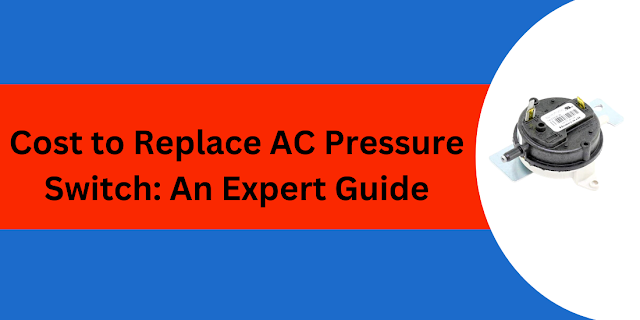Tecumseh Compressor Won’t Start: Here’s How To Fix It
Tecumseh products, particularly their compressors, are renowned for their reliability in HVAC systems, including air conditioning, refrigeration, and heat pumps. However, even the most durable compressors can encounter issues, and one common problem is when a Tecumseh compressor fails to start. This can disrupt the efficiency of your system, leaving it unable to cool or heat properly. In this guide, we will walk you through the common causes and provide practical solutions to get your Tecumseh compressor up and running again.
Common Causes and Fixes for a Tecumseh Compressor Not Starting
Here are the common causes and fixes for a Tecumseh compressor that won’t start.
1. Defective Pressure Switch
A pressure switch is used to monitor the refrigerant pressure and protect the compressor from running under unsafe conditions. The compressor might not start if the pressure switch isn't working properly.
Possible Causes:
Low Pressure: If the system is low on refrigerant or if the expansion valve is defective, the pressure switch will sense the low pressure and it will not allow the compressor to start.
Faulty Switch: The pressure switch itself can wear out over time and not work correctly.
How to Fix:
Use a gauge to check the refrigerant pressure and make sure it’s within the manufacturer’s specified range.
Check the continuity of the pressure switch and replace it if needed.
2. Overheating or Overload Protection
Tecumseh compressors come equipped with built-in thermal overload protection, which is designed to prevent damage to the compressor if it becomes too hot. The compressor will automatically turn off and stop beginning until it cools down if it is overheating.
Possible Reasons:
Dirty Coils: The compressor may overheat if the condenser or evaporator coils are dirty.
Low Refrigerant Levels: The compressor will have to work harder and run the risk of overheating if the refrigerant levels are low.
Failed Fan: In the system, if the fan isn’t working properly the compressor can overheat due to a lack of airflow.
How to Fix:
Remove dirt and debris from the condenser coils.
Check the levels of refrigerant and recharge it if needed (no leak).
Verify that the fan motor and blades are operating correctly. If need be, replace or repair the fan.
3. Compressor Contactor or Relay Issues
The compressor contactor is in charge of turning the compressor's electricity on and off. The compressor may not be able to start or receive electricity if the contactor or relay is malfunctioning.
Possible Causes:
Worn-out Contact Points: The inside contact points can wear out over time and the contactor will then fail to make a connection.
Failed Relay: If the relay is bad, the compressor won’t start.
How to Fix:
Use a multimeter to test the contactor for continuity. If there is no continuity, replace the contactor.
Make sure the relay works properly. If necessary, replace the relay.
4. Capacitor Failure
Capacitors are essential parts that provide the compressor with the electrical charge it needs to start. If the capacitor is faulty, the compressor may fail to start, even if the power supply and other components are functioning correctly.
Possible Causes:
Aged Capacitor: Capacitors degrade with time and can no longer store energy.
Overvoltage or Power Surge: The capacitor can be damaged by a power surge and not work correctly.
How to Fix:
Test the capacitor’s condition with a multimeter. Replace the capacitor if the capacitor is out of spec or shows no reading.
When replacing the capacitor, make sure you have the correct voltage and microfarad (µF) rating for your particular Tecumseh compressor model.
5. Faulty Compressor Motor
In some cases, the problem may lie within the compressor motor itself. If the motor is defective or damaged, the compressor won’t be able to start.
Possible Causes:
Worn Bearings: The bearings inside the motor can wear out over time, causing friction and not allowing the motor to turn on.
Burnt Windings: If the compressor motor has shorted windings or burnt components, it will not start.
How to Fix:
Look for damage to the compressor motor, including burned-out windings or unusual noises. The motor will need to be replaced if it is defective.
If the motor is making friction or noise, lubricate the bearings.
6. Incorrect or Low Refrigerant Levels
Low refrigerant levels can also prevent your Tecumseh compressor from starting. If the refrigerant is too low, the compressor may fail to engage because it cannot build the required pressure.
Possible Causes:
Refrigerant Leaks: A slow refrigerant leak could result in low pressure and prevent the compressor from running.
Improper Refrigerant Charge: If the system is not properly charged with the right amount of refrigerant, the compressor may struggle to start.
How to Fix:
Check for leaks in the refrigerant lines using a leak detector or soap solution.
Check the system and refuel it with the appropriate kind and quantity of refrigerant if there are no leaks.
A Tecumseh compressor that won’t start can often be fixed with proper troubleshooting. Always put safety first, and if necessary, seek advice from a qualified HVAC specialist to make sure your system is operating effectively.



Comments
Post a Comment